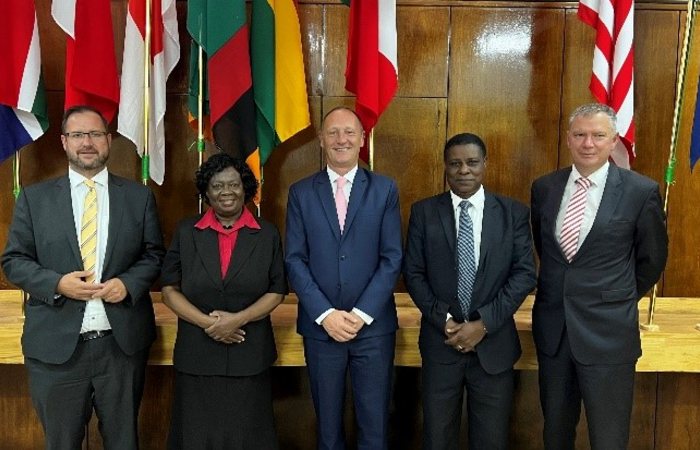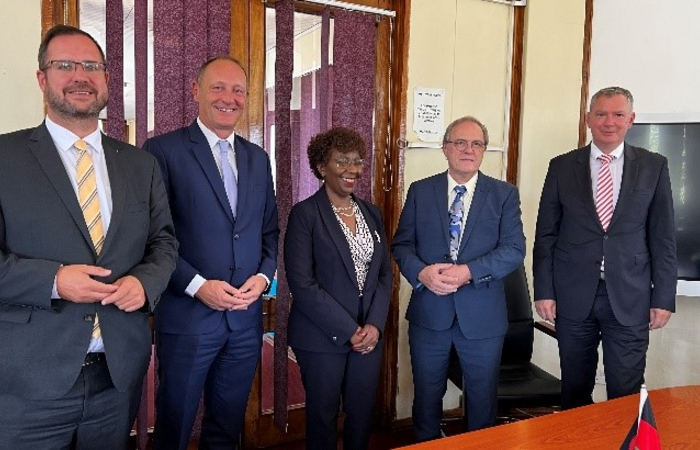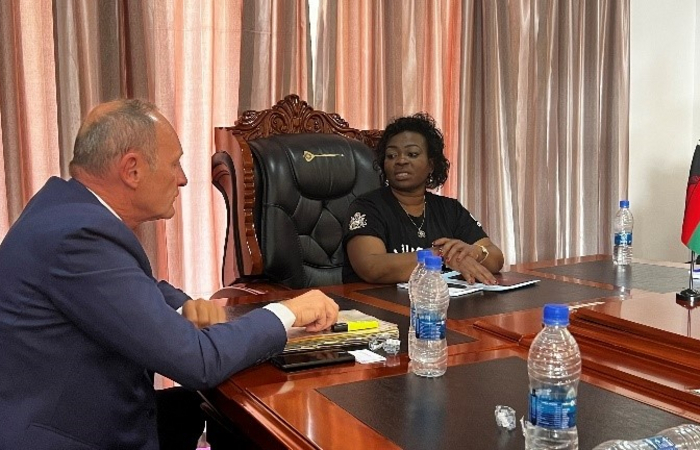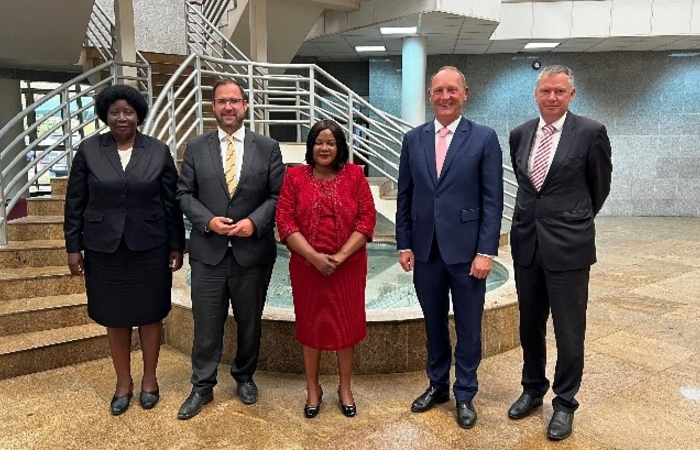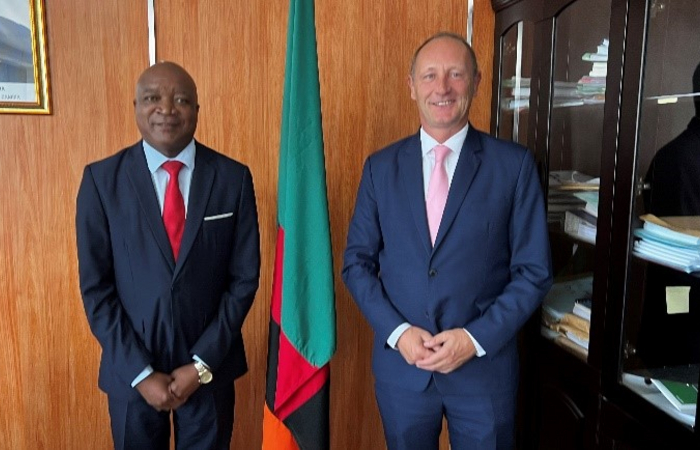Malawi and Zambia
Insights into Education Policy
The Lilongwe University of Agriculture and Natural Resources (LUANAR) is located around 40 km outside the Malawian capital Lilongwe.
The university emerged from the Bunda College for Agriculture and currently has around 10,000 students, 200 lecturers and 5 faculties. The university has international collaborations primarily with countries in southern Africa; from Europe, the Stuttgart-Hohenheim University of Applied Sciences and the University of Nottingham cooperate with LUANAR. There are stronger collaborations with US universities (Michigan, Kansas State, North Carolina, Mississippi).
There is currently no cooperation with Austrian universities and colleges, even though the University of Natural Resources and Life Sciences would be ideally suited here. For this reason, during his education policy delegation trip to Malawi and Zambia in September 2022, MMMag. Dr. Axel Kassegger, President of the Freedom Institute for Education and Foreign Policy and Chairman of the Parliamentary Friendship Group Austria - Sub-Saharan Africa, presented the Austrian Africa-UniNet program to promote cooperation between Austrian and African universities in the field of teacher exchange and research. The Austrian delegation met Vice-Chancellor Prof. Emmanuel Kaunda, Deputy Vice-Chancellor Asc. Prof. Dr. Agnes Mbachi Mwangwela and other executives of Lilongwe University of Agriculture and Natural Resources at the university's premises for talks and educational policy exchange.
The delegation was invited to visit the university's research facilities on its huge campus. The Japanese-funded project to optimize fish farming is worth mentioning here, and Norway has also provided the university with massive support for the expansion of its infrastructure in recent years.
The program also included a meeting with Honorary Consul Bruno Kloser and Austrians based in Malawi, including two engineers from "Posch und Partner GmbH" from Innsbruck, who have been working in Lilongwe for several years as consultants and project managers for the city government of Lilongwe as part of a project financed by the World Bank to improve the water supply in the Malawian capital.
At a meeting with the Minister of Education of the Republic of Malawi, Hon. Agnes NyaLonje, at the Ministry of Education, who provided insights into the country's education system: In Malawi too, a lack of resources in terms of both infrastructure and suitable teaching staff is a particular challenge, especially at primary level. After all, 90% of children in Malawi start school, but only 51% complete primary school. At secondary school level, the proportion of children who complete this level is only 15%, with less than 1% of a year group going on to attend university. International aid is provided by US-AID, the EU and the World Bank; the Austrian Africa-UniNet program was presented by delegation leader Dr. Kassegger and received with great interest.
At a conference with members of the Malawian parliament's Foreign Affairs Committee on the parliament's premises, the focus was on getting to know each other and discussing the impact of the Ukraine-Russia war on Malawi. In addition to concerns about the supply situation with oil and gas, the Malawian colleagues expressed particular concern about the supply of wheat and fertilizers. There is also concern that the entire world's attention is focused on this region and that Africa is being "forgotten" in this context.
The wish remained to meet again with the Freedom Party delegation consisting of the President of the FBI, Member of Parliament Dr. Axel Kassegger (Foreign Policy Spokesperson and Chairman of the Parliamentary Friendship Group Austria - Sub-Saharan Africa), Member of Parliament Christian Hafenecker (Chairman of the Committee for Research, Innovation and Digitalization) and the Deputy Chairman of the Freedom Party Parliamentary Club DI Walter Asperl (Spokesperson for Education, Science and Research) at the IPU conference in Kigali/Rwanda in October 2022.
This was followed by a meeting with the Speaker of the Malawian Parliament, Rt. Hon. Catherine Gotani Hara took place. President Gotani Hara is the 14th President of the Malawian National Assembly with 193 members (unicameral system) since the country's independence in 1964. She thanked the delegation for the visit and gave them the opportunity to discuss the working methods and processes in the Malawian parliament and compare them with those of the Austrian parliament during a detailed tour of the building.
In the neighboring country of Zambia, a meeting with the Minister of Justice of the Republic of Zambia, Hon. Mulambo Haimbe, at the Ministry of Justice in Lusaka was on the agenda. In addition to analyzing the differences and similarities between the respective judicial systems, there was an opportunity for an intensive informative exchange on the topics of constitutional reform, separation of powers, ensuring the independence of courts and, above all, the possibilities of facilitating trade regulations between the EU and Zambia. Minister Haimbe also expressed his concern that the Ukraine-Russia conflict could result in higher prices for oil, gas and food, although the equally higher copper prices are having a positive impact on Zambia as Africa's second-largest copper exporter.
This was followed by a meeting with the First Deputy Speaker of the Zambian Parliament, Hon. Malungo A. Chisangano. Zambia also has a unicameral system with a total of 167 members of parliament. A special feature of the Zambian parliament is that 156 of the 167 MPs are elected, eight are appointed by the President and three are members by virtue of office. Head of delegation Dr. Kassegger referred to the many years of bilateral parliamentary cooperation between Austria and Zambia as part of the NorthSouthDialogue. The Deputy Speaker of Parliament expressed her gratitude for the visit of a Zambian delegation of experts from the Zambian Parliament on budget issues to Vienna in June 2022 for the purpose of presenting the working methods of the Austrian Parliament's budget service. Ms. Chisangano also reported on a strategic project in Zambia to strengthen the education sector in line with the goals of SDG No. 4 in the country. This will run from 2020 to 2024 and MPs are actively involved in it.
This was followed by a meeting with the Rector of the University of Zambia, Prof. Anne Lungowe Sikwibele, on the university campus. The University of Zambia was founded in 1965, one year after independence, and is the largest and most renowned university in the country with 30,000 students in 12 faculties ("schools") and three research institutes. This university also faces the same problems as many African universities: Inadequate infrastructural facilities, particularly with regard to workshops and laboratories, too few highly qualified teaching staff and insufficient availability of accommodation for students. In terms of international cooperation, the university runs projects with the USA, China and other countries. The involvement of Japan in the field of veterinary medicine and that of Germany in the field of pharmacy is worth mentioning. There is no cooperation with Austria, which is why the Africa UniNet project was also presented here.
The last appointment was a meeting with the Zambian Minister of Education, Hon. Douglas Syakalima, on the premises of the Ministry of Education. In addition to primary and secondary education, Minister Syakalima is also responsible for the entire tertiary sector, making him the de facto Minister of Science. President Hakainde Hichilema also proclaimed the "free education for all" project in Zambia in 2021. Previously, 50% of children in Zambia did not go to school at all, and the Zambian education system is also facing enormous challenges when it comes to implementing this strategic project, as reported by the minister in charge, Syakalima. In 2022 alone, 30,000 new teachers were recruited and 60,000 more are urgently needed. Support in capacity building, both in terms of infrastructure and teaching staff, is urgently needed.
